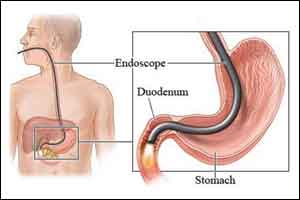- Home
- Editorial
- News
- Practice Guidelines
- Anesthesiology Guidelines
- Cancer Guidelines
- Cardiac Sciences Guidelines
- Critical Care Guidelines
- Dentistry Guidelines
- Dermatology Guidelines
- Diabetes and Endo Guidelines
- Diagnostics Guidelines
- ENT Guidelines
- Featured Practice Guidelines
- Gastroenterology Guidelines
- Geriatrics Guidelines
- Medicine Guidelines
- Nephrology Guidelines
- Neurosciences Guidelines
- Obs and Gynae Guidelines
- Ophthalmology Guidelines
- Orthopaedics Guidelines
- Paediatrics Guidelines
- Psychiatry Guidelines
- Pulmonology Guidelines
- Radiology Guidelines
- Surgery Guidelines
- Urology Guidelines
New biomarkers for colorectal cancer

Researchers from the University of Luxembourg found a new biomarker for colorectal cancer (CRC) that might improve therapy and survival rates of patients. Biomarkers are measurable biological indicators for a specific disease, such as changes in the amounts of certain proteins that occur in combination with certain illnesses. Such biomarkers help physicians to diagnose a condition, identify the disease stage, and determine a patient's risk for recurrence of the disease. This supports the doctor in choosing the best-fitting treatment plan.
For colorectal cancer (CRC), early detection and classification is especially important, as, for example, not all Stage II patients benefit from chemotherapy. Especially identifying patients at risk for recurrence during the early course of the disease might help clinicians. However, there are still too few prognostic markers for colorectal cancer known so that too many patients still suffer needlessly from side effects of the chemotherapy without having real benefits.
In a study supported by the Fondation Cancer and the Luxembourg National Research Fund (FNR), an interdisciplinary team composed of experimental and computational scientists from the Molecular Disease Mechanisms (MDM) group at the Life Sciences Research Unit of the University of Luxembourg has recently discovered a new promising biomarker for colorectal cancer. Especially in early stages, such markers might allow to classify patients into "high" and "low" risk group. Such a classification may help oncologists choosing the adequate treatment regimens for a given patient. "The strength of the study lies in the concerted effort and the interdisciplinary approaches, involving bioinformatics and state-of-the-art experimental techniques. Especially the financial support from the Fondation Cancer has been crucial for the successful completion of our biomarker projects," explains Dr. Elisabeth Letellier, principal investigator in the MDM group.
Using a previously established meta-analysis of publicly available gene expression data, the research team identified the protein family "Myosin" and especially the protein "MYO5B" as potential prognostic marker in the context of CRC. Members of this family are recognised to play a major role in cellular trafficking and polarisation of cells and have recently been reported to be closely associated with several types of cancer.
The meta-analysis, as well as an independent patient cohort study, revealed that the concentration of "MYO5B" decreases as the disease progresses. CRC patients with low "MYO5B" expression had significantly lower chances of disease- and metastasis-free survival. Altogether, the data collected from the Molecular Disease Mechanisms (MDM) group identify MYO5B as a powerful prognostic biomarker in CRC, especially in early stages (stages I and II), which might help stratifying patients with stage II for adjuvant chemotherapy.
LSRU-team identifies new prognostic biomarkers for CRC
"Together with our partners, we have been able to set up a high-quality tissue collection from colon cancer patients here in Luxembourg. Only the close collaboration with the Integrated Biobank of Luxembourg (IBBL), the Laboratoire National de Santé (LNS), the Centre d'Investigation et d'Épidémiologie Clinique (CIEC) and local hospitals, primarily the Centre Hospitalier Emile Mayrisch (CHEM), has allowed us to establish these important foundations for further colon cancer projects," says Prof. Dr. Serge Haan, Head of the MDM group.
In this research project, the MDM group has analysed the value of a biomarker in a Luxembourgish colorectal cancer (CRC) collection. Indeed, they have established a CRC collection that includes tissue samples from patients. This collection is of high value as it allows, for example, the identification of new prognostic biomarkers for CRC as highlighted in the present project.

Disclaimer: This site is primarily intended for healthcare professionals. Any content/information on this website does not replace the advice of medical and/or health professionals and should not be construed as medical/diagnostic advice/endorsement or prescription. Use of this site is subject to our terms of use, privacy policy, advertisement policy. © 2020 Minerva Medical Treatment Pvt Ltd